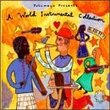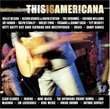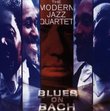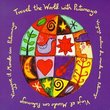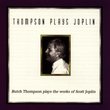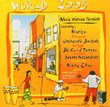| All Artists: Various Artists Title: From Avenue A to the Great White Way 1914-1950 Members Wishing: 3 Total Copies: 0 Label: Sony Release Date: 4/30/2002 Album Type: Original recording remastered Genres: Folk, International Music, Jazz, Pop, Broadway & Vocalists Styles: Jewish & Yiddish, Vocal Jazz Number of Discs: 2 SwapaCD Credits: 2 UPC: 696998632325 |
Search - Various Artists :: From Avenue A to the Great White Way 1914-1950
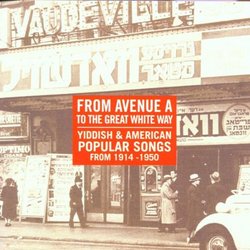 | Various Artists From Avenue A to the Great White Way 1914-1950 Genres: Folk, International Music, Jazz, Pop, Broadway & Vocalists
From Avenue A to the Great White Way is a two-CD set that collects 50 songs tracing the early recorded history of Jewish music in New York and the subsequent influence that music had on American popular song. Henry Sapozni... more » |
Larger Image |
CD DetailsSynopsis
Amazon.com From Avenue A to the Great White Way is a two-CD set that collects 50 songs tracing the early recorded history of Jewish music in New York and the subsequent influence that music had on American popular song. Henry Sapoznik, the producer of The Yiddish Radio Project series that appeared on PBS, compiled the tracks. He's unearthed some fascinating items, including rare recordings from early stars of the Yiddish theater such as Molly Picon, a klezmer piece by Abe Schwartz, and a beautifully operatic performance from the cantor Yossele Rosenblatt. Among his most interesting finds are the previously unreleased track from 1914 of Irving Berlin singing his song "What Am I Gonna Do?" and a vocal group from 1933 known as the Funnyboners singing the obscure Gershwin tune "Mischa-Yascha-Toscha-Sascha." Sapoznik's excellent liner notes do a fine job of connecting the dots between such seemingly disparate songs as the 1928 Yiddish song "Inzer Rebin's Vunder (Our Rabbi's Wonder)" and Cab Calloway's 1939 swing tune "Utt-Da-Zay (That's the Way)." While it would have been nice to have translation of the Yiddish lyrics, that is just a minor quibble with what is a otherwise intriguing survey of long overlooked part of American musical history. --Michael Simmons Similarly Requested CDs
|
CD ReviewsGevald! Di Bananas and das pernicious influence Larry Mark | nyc | 09/08/2002 (5 out of 5 stars) "Darn that pernicious Jewish influence in American music. (hehe) If there was a Grammy for this category, Henry Sapoznik and his posse would receive it without question. The CD's are made to look like an old Columbia 78 RPM. The 14 page liner notes are very good; they include photos of the most famous singers, and a picture of "vaudeville" in Yiddish characters and a line outside The Grand Theater's "King Lear." They exclude the lyrics, however. After listening to the first CD three times, I was ready to move on to the second CD. Is this Himmel? You bet! Let's not forget that the Yiddish Theater of Manhattan's Second Avenue had Shakespeare and musicals while Broadway was in the dark ages of entertainment, awaiting O'Neill. Sapoznik has compiled 50 pieces from newly found vaulted stampers, including: a very sexy English and French piece by Al Jolson (Hooray Baby and Me); Julien Rose's Chicken story; a previously unissued version of "Mischa Yascha Toscha Sascha" (1933) by the Funnyboners (Gershwins and others) with apologies to Jack Benny; "Roumania Roumania" by Aaron Lebedeff (1941); "Bei Mir Bis Du Schon" by Belie Baker (1937); and "What Am I Gonna Do?" (1914) by Irving Berlin (never released before). Yoselle Rosenblatt is the soloist in "V'Hakohanim" (1916); and Molly Picon sings "Ihr Megt Gleybn Oder Neyn" in a previously unissued performance from 1933. "Yes, Sir, Zi Iz May Kale (Yes Sire She's My Bride/Baby)" is sung by Peisachke Burstein (1925). Eddie Cantor sings "Palesteena" (1920), and one wonders if there are some hidden meanings in the words. Abe Schwartz appears with his 1918 "Der Shtiller Bulgar," a current standard of every klezmer group. "Yosel," a Yiddish standard, is performed by Nellie Casman in Yiddish (1923). The same song is reprised in 1938 in "Joseph, Joseph" by Trombonist Russ Morgan and Orchestra, sung in English by Carolyn Clarke. Amazing! "Since Henry Ford Apologized To Me" by the Happiness Boys (1927) is an amazing find; the satirical song reacts to Ford and his Dearborn Press' virulent anti-Semitism. The "Yiddisha Charleston" also includes a jab at Henry Ford. Xavier Cugat and His Orchestra (in pre-Charo 1950) perform "The Wedding Samba" so well with Abbe Lane that you might as well be in Miami Beach while listening to it. Both Benny Goodman and his break-away drummer, Gene Krupa, appear in the final two cuts. But by far, my favorite cut, worth the purchase, hands down is "Whoopee" by Peisachke Burstein. Impossible to get out of one's head after one listen." From Avenue A Israel Beat | Jerusalem, Israel | 03/30/2003 (3 out of 5 stars) "If not for this album, one might never have known that Fannie Brice was sent to the lower east side of New York so she could sound more stereotypically Jewish, or that Jewish vaudeville performers found success in "best Hebe contests" and songs like "Cohen Owes Me Ninety-Seven Dollars." This is the world of From Avenue A to the Great White Way: Yiddish and American Popular Songs from 1914-1950. The double CD set has extensive liner notes and photos acting almost like an historical document into a world that, for better or worse, many younger Jewish people inherited but never knew existed. If you remember Molly Goldberg calling "yoo-hoo" on the old radio show The Goldbergs then you'll probably remember Eddie Cantor singing about Leena from Palestina. That's just one of the oldies featured, many of which sound like and come from the same era as You're Never Fully Dressed Without a Smile from the musical Annie. The double CD set begins with the old style Yiddish theater songs from people like Molly Picon and David Medoff. It continues chronologically hitting upon the vaudeville era and into the jazz age. Many tunes seem self-depreciating like Since Henry Ford Apologized to Me and When Nathan Was Married to Rose of Washington Square. Other tracks are by non-Jewish performers who jumped on the bandwagon like Cab Calloway of Minnie the Moocher fame and Slim Galliard with a song called Matzo Balls. The album ends with Jewish jazz performers such as Benny Goodman and Gene Krupa. Although well known performers such Al Jolson and Irving Berlin are here, most of the tracks have been completely forgotten or lost making this a collection of things one has either never heard before or only heard on the radio when they first came out. The sound quality of the songs is very good for their age, having been re-mastered from the original 78 rpm records. For some this will bring back some great memories, and those that can't understand shouldn't criticize. Others will be disgusted at the depiction of Jewish people in such a manner. Perhaps this was "what made Sammy run" to assimilate into the great White way of America. It's a real shame because there are some real gems on hear that were performed with the purest of intentions."
|

 Track Listings (25) - Disc #1
Track Listings (25) - Disc #1

